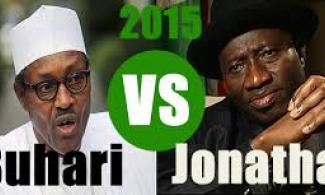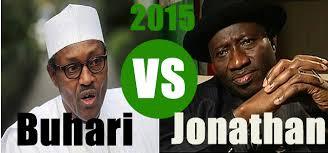
Goodluck Jonathan, Muhammadu Buhari, Attahiru Jega, Boko Haram leader Shekau, and Nigeria's Security Chiefs may prove to be the personalities which change Nigeria's history in less than one week.

Africa’s most populous country and top economy, Nigeria, holds general elections this Saturday — the fifth since civilian rule was restored in 1999.
Here are five key figures whose actions could shape the outcome of the vote and its aftermath.
– Goodluck Jonathan –
A man walk past campaign posters of Nigerian President Goodluck Jonathan and candidate of the ruling People’s Democratic Party (PDP) in Lagos, on March 21, 2015. Africa’s most populous nation, Nigeria, goes to the polls to elect a new president next week after a controversial postponement, with the six-week delay seeing major gains against the Boko Haram jihadists. AFP PHOTO
Critics say he has failed to tackle corruption or improve infrastructure, especially electricity supply, but Jonathan still has supporters, particularly in the mainly Christian south of the religiously divided nation.
Nigerians have never seen power change hands through the ballot since independence from Britain in 1960 but Jonathan has repeatedly vowed to respect the will of the voters.
If the election tilts in the opposition’s favour, all eyes will be on the president to see if he keeps that promise.
– Muhammadu Buhari –
Buhari, 72, insists he will win this time, refusing to even discuss the prospect of another defeat.
A roadside restaurant features on March 12, 2015 a poster of main opposition All Progressives Congress (APC) presidential candidate Mohammadu Buhari in Lagos. Buhari, the 72-year-old candidate of the APC is in neck-and-neck with President Goodluck Jonathan in the closely fought election campaign, which initially was expected to be held on February 14, but rescheduled for March 28 due to security concern. AFP PHOTO
If Jonathan is declared the winner, Buhari’s actions could prove crucial in avoiding widespread post-election unrest.
Experts say the predominantly Muslim north is a tinderbox that may explode if Buhari, the region’s favourite son, is perceived as having been cheated out of an electoral win.
Buhari’s moves as the results come in will therefore be closely watched.
– Abubakar Shekau –
Boko Haram’s leader, a wanted criminal who is suspected of orchestrating crimes against humanity, has vowed to disrupt the polls, which the Islamist group views as “un-Islamic”.
That sinister pledge may turn out to be empty bluster but given Boko Haram’s proven ability to sow chaos across northern Nigeria, the possibility exists of widespread attacks, including bombings, on polling day.
– Attahiru Jega –
The head of Nigeria’s Independent National Electoral Commission (INEC) has faced fierce criticism from both the opposition and the ruling party during the campaign.
But impartial observers broadly see him as tough-minded, independent administrator committed to overseeing a fair and credible vote.
The career academic cut his political teeth opposing the brutal military dictatorship of Sani Abacha in the late 1990s.
Given his background, most experts believe Jega will seek to declare an accurate result as quickly as possible, regardless of any political interference he may face.
– Security chiefs –
The independence of Nigeria’s military and police around election day will likely be crucial in ensuring the vote is respected nationwide.
The defence ministry has issued clear statements declaring itself to be a completely non-partisan actor in the polls but troubling events in recent months have raised concern.
Officers, believed to be from the police force, fired teargas on senior opposition lawmakers as they tried to enter parliament for a key vote in November.
The opposition has specifically identified AIG Joseph Mbu in charge of Lagos and Ogun States as being an outspoken loyalist of the ruling party.
Observers say that avoiding confrontation between the security services and political demonstrators should be a top priority.